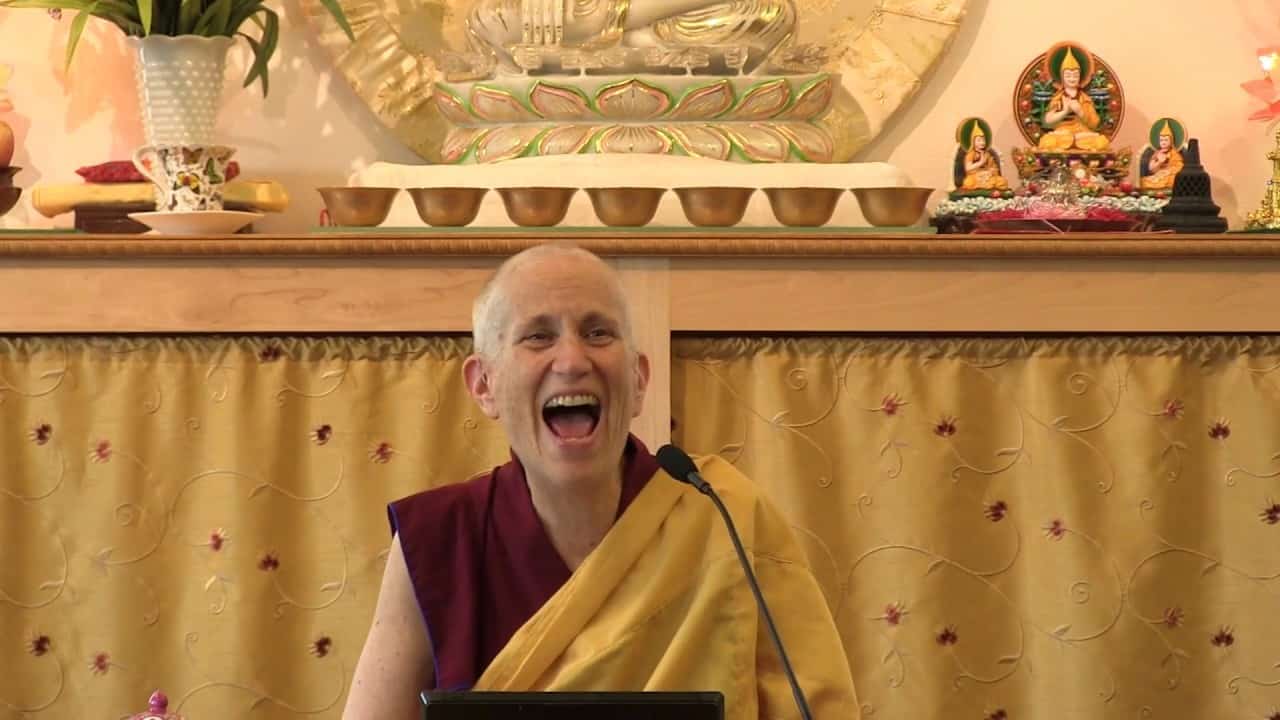The fourth nonvirtue of speech: Idle talk (part 1)
The eighth of a series of teachings on the four nonvirtues of speech recorded at the Luminary Temple in Taiwan.
The fourth type of speech that the Buddha recommended we abstain from is idle talk. Idle talk can take many forms. It can be just chatting about the weather, about politics, about sports–oh forgive me, all you sports fans–about sales, what department stores have sales, about your hair, and about your clothes, and about, you know, business deals, and about movie stars, and about athletes you know all this kind of stuff and especially about what other people we know do. We have to understand exactly what idle talk is and what it isn’t, because the motivation for idle talk has to be just to basically pass the time and be entertained. And so we laugh and we joke and blah blah blih blih, okay? It wastes a lot of people’s time, especially if you’re a spiritual practitioner and your time is very precious, and you want to use it in another way, but somebody’s just sitting there talking to you about… telling you a story about their family that you’ve heard 15 times before, something like that.
That doesn’t mean that every time we talk to somebody we need to have a deep, meaningful discussion about the nature of reality. Not at all. We need to talk about practical things, we need to talk about how we’re relating to each other, and you know, clear up things if there’ve been misunderstandings. And in certain situations, we need to do what looks like idle talk but we’re doing it not with a motivation just to kill time and make ourselves look good by telling good stories, but we’re doing it with the motivation to connect to people.
Very often in a work situation, or speaking with your neighbors, you just talk about sports, or something light, some movies, I don’t know what people talk about these days, movies, and music, and what the children are doing and all of this. But you talk about it and in your mind you’re very aware, I’m talking about this as a way to connect with this individual. Because certainly when you’re talking to your neighbor, or your colleague at work, you need to chat. You can’t just walk by, and [say] I’m a Dharma practitioner, I don’t waste time talking unnecessarily to people. That’s not going to create very good energy. But you know, you’re friendly, you’re kind, you chat, but not to excess. You do it enough just to connect to people, and then you stop. And then hopefully from there some deeper relationship can happen with the people and slowly evolve.
But what we really want to be careful about when we’re talking with other people is first of all gossip that is spreading untrue stories about other people, so that could become a form of lying. “Oh, so-and-so went to move here.” So all we knew is they moved from this town to this town. That’s the facts. But then we start adding our opinion. “Oh, I think they moved from here to here because they used to be dating that person, but then they’re not dating that person, or they had a fight with their mother.” And then we give our whole hypothesis about why somebody moved from one town to the other. That’s not very good.
Venerable Thubten Chodron
Venerable Chodron emphasizes the practical application of Buddha’s teachings in our daily lives and is especially skilled at explaining them in ways easily understood and practiced by Westerners. She is well known for her warm, humorous, and lucid teachings. She was ordained as a Buddhist nun in 1977 by Kyabje Ling Rinpoche in Dharamsala, India, and in 1986 she received bhikshuni (full) ordination in Taiwan. Read her full bio.


